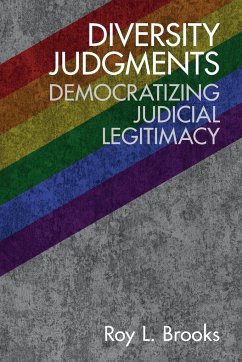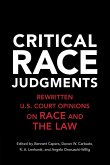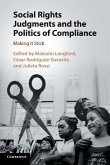Roy L. Brooks (University of San Diego School of Law)
Diversity Judgments
Roy L. Brooks (University of San Diego School of Law)
Diversity Judgments
- Broschiertes Buch
- Merkliste
- Auf die Merkliste
- Bewerten Bewerten
- Teilen
- Produkt teilen
- Produkterinnerung
- Produkterinnerung
In order for the US Supreme Court to retain its integrity and legitimacy, it needs to reflect society's commitment to diversity and inclusion. Brooks argues that the Court decides cases within a framework of judicial legitimacy that is rooted not in today's society, but in eighteenth-century Anglo-American culture.
Andere Kunden interessierten sich auch für
![Critical Race Judgments Critical Race Judgments]() Critical Race Judgments45,99 €
Critical Race Judgments45,99 €![Social Rights Judgments and the Politics of Compliance Social Rights Judgments and the Politics of Compliance]() Social Rights Judgments and the Politics of Compliance50,99 €
Social Rights Judgments and the Politics of Compliance50,99 €![Feminist Judgments Feminist Judgments]() Feminist Judgments54,99 €
Feminist Judgments54,99 €![Feminist Judgments Feminist Judgments]() Feminist Judgments55,99 €
Feminist Judgments55,99 €![Feminist Judgments Feminist Judgments]() Feminist Judgments53,99 €
Feminist Judgments53,99 €![Feminist Judgments Feminist Judgments]() Feminist Judgments43,99 €
Feminist Judgments43,99 €![Numerical Reasoning in Judgments and Decision Making about Health Numerical Reasoning in Judgments and Decision Making about Health]() Numerical Reasoning in Judgments and Decision Making about Health100,99 €
Numerical Reasoning in Judgments and Decision Making about Health100,99 €-
-
-
In order for the US Supreme Court to retain its integrity and legitimacy, it needs to reflect society's commitment to diversity and inclusion. Brooks argues that the Court decides cases within a framework of judicial legitimacy that is rooted not in today's society, but in eighteenth-century Anglo-American culture.
Hinweis: Dieser Artikel kann nur an eine deutsche Lieferadresse ausgeliefert werden.
Hinweis: Dieser Artikel kann nur an eine deutsche Lieferadresse ausgeliefert werden.
Produktdetails
- Produktdetails
- Verlag: Cambridge University Press
- Seitenzahl: 658
- Erscheinungstermin: 1. März 2022
- Englisch
- Abmessung: 229mm x 152mm x 35mm
- Gewicht: 896g
- ISBN-13: 9781108440066
- ISBN-10: 1108440061
- Artikelnr.: 62027455
- Herstellerkennzeichnung
- Libri GmbH
- Europaallee 1
- 36244 Bad Hersfeld
- gpsr@libri.de
- Verlag: Cambridge University Press
- Seitenzahl: 658
- Erscheinungstermin: 1. März 2022
- Englisch
- Abmessung: 229mm x 152mm x 35mm
- Gewicht: 896g
- ISBN-13: 9781108440066
- ISBN-10: 1108440061
- Artikelnr.: 62027455
- Herstellerkennzeichnung
- Libri GmbH
- Europaallee 1
- 36244 Bad Hersfeld
- gpsr@libri.de
Roy L. Brooks is Warren Distinguished Professor of Law at the University of San Diego. He is the recipient of five book awards and the author of more than twenty books, including The Racial Glass Ceiling: Subordination in American Law and Culture (2017), Racial Justice in the Age of Obama (2009), and Atonement and Forgiveness: A New Model for Black Reparations (2004).
Preface
Acknowledgments
Introduction: the framework
Part I. Asians Americans: 1. Matal v. Tam (trademarking racial slurs)
2. Lau v. Nichols (bilingual education)
Part II. African Americans: 3. Brown v. Board of Education (single race schools)
4. Griggs v. Duke Power (employment discrimination)
5. District of Columbia v. Heller (the right to keep and bear arms)
Part III. Women: 6. Roe v. Wade (reproductive rights)
7. United States v. Virginia (single sex colleges)
8. United States v. Morrison (violence against women)
9. Kulko v. Superior Court (child custody or support)
Part IV. Latinx: 10. Hernandez v. Texas (equal protection)
11. San Antonio Indep. Sch. Dist. v. Rodriguez (school financing)
12. Plyler v. Doe (educating undocumented minors)
Part V. Native Americans: 13. Adoptive couple v. baby girl (Indian adoption)
Part VI. LGBTQ: 14. Obergefell v. Hodges (single-sex marriages)
15. Bostock v. Clayton County (employment discrimination)
Part VII. Intersectionality: 16. EEOC v. Catastrophe Mgt. Solutions Co. (Dreadlocks)
17. Kelo v. City of New London (eminent domain)
Part VIII. Outsiders v. Outsiders: 18. SFFA v. Harvard (affirmative action)
Part IX. White males: 19. McDonald v. Santa Fe Trail Trans. Co. (employment discrimination)
20. City of Atlanta v. Rolfe (law enforcement)
Part X. Situational Outsiders: 21. Gideon v. Wainwright (right to counsel)
22. Martin v. City of Boise (the homeless)
23. Citizens United v. FEC (campaign financing)
24. Trump v. Hawaii (Middle East migrants)
Index.
Acknowledgments
Introduction: the framework
Part I. Asians Americans: 1. Matal v. Tam (trademarking racial slurs)
2. Lau v. Nichols (bilingual education)
Part II. African Americans: 3. Brown v. Board of Education (single race schools)
4. Griggs v. Duke Power (employment discrimination)
5. District of Columbia v. Heller (the right to keep and bear arms)
Part III. Women: 6. Roe v. Wade (reproductive rights)
7. United States v. Virginia (single sex colleges)
8. United States v. Morrison (violence against women)
9. Kulko v. Superior Court (child custody or support)
Part IV. Latinx: 10. Hernandez v. Texas (equal protection)
11. San Antonio Indep. Sch. Dist. v. Rodriguez (school financing)
12. Plyler v. Doe (educating undocumented minors)
Part V. Native Americans: 13. Adoptive couple v. baby girl (Indian adoption)
Part VI. LGBTQ: 14. Obergefell v. Hodges (single-sex marriages)
15. Bostock v. Clayton County (employment discrimination)
Part VII. Intersectionality: 16. EEOC v. Catastrophe Mgt. Solutions Co. (Dreadlocks)
17. Kelo v. City of New London (eminent domain)
Part VIII. Outsiders v. Outsiders: 18. SFFA v. Harvard (affirmative action)
Part IX. White males: 19. McDonald v. Santa Fe Trail Trans. Co. (employment discrimination)
20. City of Atlanta v. Rolfe (law enforcement)
Part X. Situational Outsiders: 21. Gideon v. Wainwright (right to counsel)
22. Martin v. City of Boise (the homeless)
23. Citizens United v. FEC (campaign financing)
24. Trump v. Hawaii (Middle East migrants)
Index.
Preface
Acknowledgments
Introduction: the framework
Part I. Asians Americans: 1. Matal v. Tam (trademarking racial slurs)
2. Lau v. Nichols (bilingual education)
Part II. African Americans: 3. Brown v. Board of Education (single race schools)
4. Griggs v. Duke Power (employment discrimination)
5. District of Columbia v. Heller (the right to keep and bear arms)
Part III. Women: 6. Roe v. Wade (reproductive rights)
7. United States v. Virginia (single sex colleges)
8. United States v. Morrison (violence against women)
9. Kulko v. Superior Court (child custody or support)
Part IV. Latinx: 10. Hernandez v. Texas (equal protection)
11. San Antonio Indep. Sch. Dist. v. Rodriguez (school financing)
12. Plyler v. Doe (educating undocumented minors)
Part V. Native Americans: 13. Adoptive couple v. baby girl (Indian adoption)
Part VI. LGBTQ: 14. Obergefell v. Hodges (single-sex marriages)
15. Bostock v. Clayton County (employment discrimination)
Part VII. Intersectionality: 16. EEOC v. Catastrophe Mgt. Solutions Co. (Dreadlocks)
17. Kelo v. City of New London (eminent domain)
Part VIII. Outsiders v. Outsiders: 18. SFFA v. Harvard (affirmative action)
Part IX. White males: 19. McDonald v. Santa Fe Trail Trans. Co. (employment discrimination)
20. City of Atlanta v. Rolfe (law enforcement)
Part X. Situational Outsiders: 21. Gideon v. Wainwright (right to counsel)
22. Martin v. City of Boise (the homeless)
23. Citizens United v. FEC (campaign financing)
24. Trump v. Hawaii (Middle East migrants)
Index.
Acknowledgments
Introduction: the framework
Part I. Asians Americans: 1. Matal v. Tam (trademarking racial slurs)
2. Lau v. Nichols (bilingual education)
Part II. African Americans: 3. Brown v. Board of Education (single race schools)
4. Griggs v. Duke Power (employment discrimination)
5. District of Columbia v. Heller (the right to keep and bear arms)
Part III. Women: 6. Roe v. Wade (reproductive rights)
7. United States v. Virginia (single sex colleges)
8. United States v. Morrison (violence against women)
9. Kulko v. Superior Court (child custody or support)
Part IV. Latinx: 10. Hernandez v. Texas (equal protection)
11. San Antonio Indep. Sch. Dist. v. Rodriguez (school financing)
12. Plyler v. Doe (educating undocumented minors)
Part V. Native Americans: 13. Adoptive couple v. baby girl (Indian adoption)
Part VI. LGBTQ: 14. Obergefell v. Hodges (single-sex marriages)
15. Bostock v. Clayton County (employment discrimination)
Part VII. Intersectionality: 16. EEOC v. Catastrophe Mgt. Solutions Co. (Dreadlocks)
17. Kelo v. City of New London (eminent domain)
Part VIII. Outsiders v. Outsiders: 18. SFFA v. Harvard (affirmative action)
Part IX. White males: 19. McDonald v. Santa Fe Trail Trans. Co. (employment discrimination)
20. City of Atlanta v. Rolfe (law enforcement)
Part X. Situational Outsiders: 21. Gideon v. Wainwright (right to counsel)
22. Martin v. City of Boise (the homeless)
23. Citizens United v. FEC (campaign financing)
24. Trump v. Hawaii (Middle East migrants)
Index.








